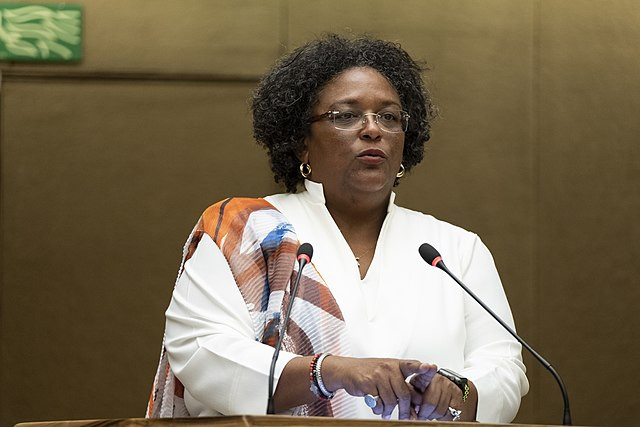During a recent speech at the London School of Economics, Barbados Prime Minister Mia Mottley called on the United Kingdom to pay $4.9 trillion in reparations for the transatlantic slave trade. Mottley, an alumna of the institution, urged a global dialogue on reparations for countries affected by the slave trade.
The amount Mottley requested aligns with data from a report released in June titled "Compensation for the Transatlantic Slave Trade in the Americas and the Caribbean." Supported by economists from the Brattle Group, the report was jointly published by the American Society of International Law and the University of the West Indies. It analyzed the wealth and GDP accumulated by former colonial nations through the exploitation of African labor, calculating the reparations owed to affected countries.
According to the report, the total debt owed by all former colonial nations, including Brazil, the UK, the Netherlands, and the USA, amounts to $131 trillion, calculated at a 2.5% interest rate. The UK owes $26 trillion to all countries and regions affected by the transatlantic slave trade, including Cuba, the Dominican Republic, and Haiti; the USA owes $37 trillion, and the Netherlands $4 trillion.
On July 1, the Dutch royal family apologized for profiting from the slave trade for the first time, marking the 150th anniversary of the abolition of slavery in the Netherlands. King Willem-Alexander apologized to thousands of descendants of colonial slaves and asked for their forgiveness.
Since becoming Prime Minister of Barbados in 2018, Mottley has repeatedly called for expanding the global impact of the slave trade reparations issue. She has also praised comments by King Charles of the UK acknowledging the impact of the slave trade. The day before her speech, Mottley met with new UK Foreign Secretary David Cameron. When asked about Cameron's thoughts on the UK's debt related to the slave trade, Mottley declined to reveal details, expressing her belief that Cameron, as Foreign Secretary, would align with Charles.
UK Prime Minister Rishi Sunak publicly refused to apologize or offer reparations for the slave trade in April. When Labour MP Bell Ribeiro-Addy asked Sunak about apologies and reparations, he rejected the proposal, stating that the UK government's priority should be resolving domestic conflicts rather than dwelling on various historical issues.
Historical records show that between 12 and 20 million Africans were sold into slavery during the transatlantic slave trade, with about 40% transported to the Caribbean. Barbados was one of the first large-scale colonial territories where Africans were the majority and one of the earliest British slave colonies, where slaves from Africa developed the sugarcane economy.
After the abolition of slavery in 1834, Barbados gained full independence in 1966, with Queen Elizabeth II as the head of state. On November 30, 2021, Barbados removed Queen Elizabeth II as head of state and exited the Commonwealth realm, remaining a member of the Commonwealth. Sandra Mason was inaugurated as President on the same day, making Barbados the world's youngest republic.
Then-Prince Charles attended Mason's inauguration ceremony in Barbados, condemning the atrocities of the slave trade and calling for a thorough dialogue to address its legacy. At the Commonwealth Heads of Government Meeting in Rwanda in June 2022, Charles reiterated the importance of reflecting on the slave trade and strengthening dialogue but did not mention economic compensation.
In January, the Church of England established a £100 million fund (approximately $120 million) to address the wrongs of the past slave trade over the next nine years. The project, not using the term "compensation," focuses on community projects that improve the impact of the slave trade.
Mottley thanked the Church of England for the fund but believed the total amount was insufficient to address the historical issues of the slave trade. She emphasized the urgency of raising global awareness about slave trade reparations for Barbados. Given the long-term impact of the slave trade, she does not expect the compensation to be paid off within a few years.




